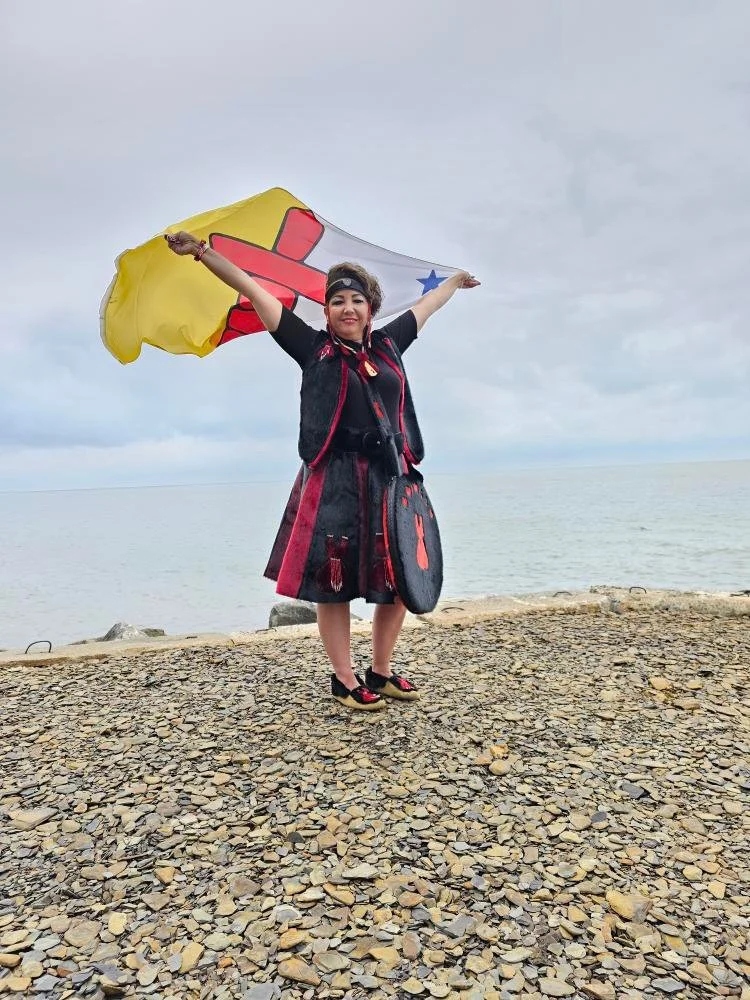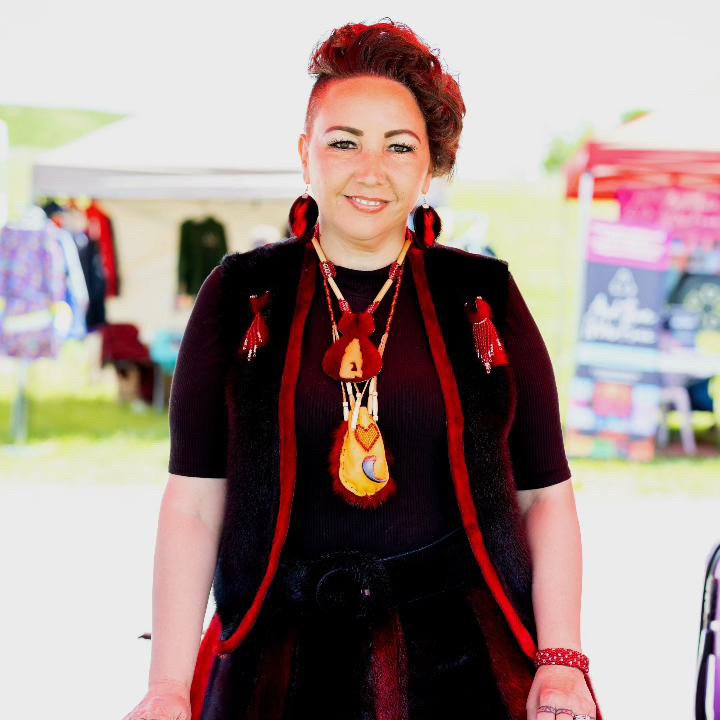Resilient Inuk
“I always say, ‘No More Stolen Sisters.’ That’s not just for our Indigenous women; that’s for all our sisters. I consider all women our sisters. And, you know, we really need to stand with each other.”
Resilient Inuk, is an Indigenous consultant, artist, and dedicated change-maker. After her sister, Pamela, went missing over two decades ago, Resilient Inuk began sharing her story to raise awareness on Indigenous issues. Her hope is to end the genocide of Indigenous women, girls, and two-spirit people in Turtle Island (Canada). To this day, her sister has not been found. So Resilient Inuk continues to use her voice, artistry, and popular platform to push for positive change. She follows the mission "No Stolen Sisters,” which she believes extends to all women, everywhere. Meet Resilient Inuk. This is her story.
P: Please introduce yourself!
RI: My government name is Vanessa Brusso but I also like to be known as Resilient Inuk. I chose that name in honour of my grandfather. I am Inuk and Ojibwe; my mother's side is Inuk and my father's side is Ojibwe. My mom comes from Sanikiluaq, Nunavut, however, she was born and raised in Moose Factory, Ontario. My father comes from Mattagami First Nation.
P: How would you describe yourself?
RI: I'm very passionate and very outspoken, but I'm also very kind. I also like to make things with my hands. I feel like I go through stages and then I outgrow them and I do other things. I’m currently in a jewellery stage. Right now, I’m making a lot of jewellery but I plan on moving to Canvas art. I like to work with ethical materials, whether I find them myself or someone gifts them to me. For instance, porcupine quills, bear claws, and seal skin - ethically sourced animal products that would otherwise end up in the garbage.
P: Tell us a story. Have you had an experience that has defined you or made you stronger?
RI: My whole life, or at least the last 20 years, so around half of my life, I've really become passionate about making change for Indigenous women. Particularly because my sister has been missing for almost 20 years, but also because of my experiences and what I'm still seeing today. Nobody pays me to do this, but it's something I'm very passionate about. I've tried to put as much energy as I can into it, and when I'm not doing that, that's when I turn to my artistic stuff to try to break away from that heavy feeling of loss, because this is real for me.
I'm not an advocate. I am just speaking my truth because this is something that I live with every day, knowing that I don't have my sister. I don't have closure. This could happen to anybody, it's not just a race thing. Yes, it's more common with Indigenous women, but this could happen to any women. This is why I don't try to just focus on Indigenous women in my messages.
All of us as women need to stand together in order to make real change for all of us.
P: What would you say to someone who doesn't understand the marginalization that women, particularly Indigenous women, experience?
RI: I would ask them to just listen and open their eyes. Like, really just listen to where we're coming from and our perspective. It's even little things, for example, like renting an apartment. Do you know how hard it is to rent an apartment as a woman, period? Even if you're Indigenous or not. We're stereotyped that we aren't the breadwinners, which is not at not true at all these days.
I think that we just need a lot more people willing to actually listen, have empathy, and sympathize with people who are actually going through this.
P: What advice would you give to young girls?
RI: That’s a tough question, and I say that because this is who I do this for. I make sure to spend time with our youth and young ones all the time, whether it's on a Pow Wow trail or within community events. Because I'm going to be gone sooner than later, you know? So this isn't about me anymore. I've already lived this, and I don't want this to happen for our future.
So, what I would tell our young ones is, first of all, believe in yourself. Because I think that many of us don't even have that to start. And if you really believe in yourself, you'll love yourself. And when you love yourself, everything else falls into place. So, I really, really think that our young ones, especially our women, believe in yourself because there have been so many restrictions placed on us because of society. You know, you can't do this, you can't do that because you're a woman, or you're not smart enough, or you're not strong enough. Well, no, don't believe any of that. That's just to get in your head, you know? As a woman, we're very, very much headstrong. Our emotions also have such a large role in how we work and how we manage to do great things. So, my thing for our youth would be to believe in yourself.
P: What does being a woman mean to you?
V: Being a woman is something that I never, ever was ashamed of. It was always something that I was very proud of. I don't know if it's my culture, because of the way I was raised, how women are the life-givers, and we hold a lot of respect for our women.
I also think, especially at my age now, something happened when I got into my 40s. I don't know what it is, if it's just my something that happens. I don't look at what I used to look at as valuable, like material things. What's valuable to me is my relationships and connections with many different powerful women. Sometimes I sit back and I think as if I know these people, you know, as if I know this woman, as if I talk to this woman. To me, that's what I feel that I'm rich because I have so many women behind me, supporting me and my friends. And they truly, truly care. That's the nice part about being a woman. You let those boundaries down and just be together. Just be safe and feel comfort. It's just a different vibe with women.
So, yeah, I'm very proud to be a woman. I would not want to be anything else.
I do have two sons, though. I don't have daughters, which I think is wonderful too because I don't know if I have more room in my house for daughters. That's the other side of women, right? Sharing shoes and makeup and stuff!
P: Is there one woman who inspires you? What would you say if they were here right now?
RI: I was inspired through music growing up. It wasn't just Buffy St. Marie, but she is a a huge role in who I am today because of her words, music and role in society.
It was also Shania Twain. She's from the same town as me, Timmins, and growing up and seeing her emerge as an artist and break the rules as a woman.
I love Pink so much too, which I think TikTok knows because that’s all that plays on my feed.
I really like and look up to a lot of women, especially artists, though. Maybe it's because I'm an artist and I connect better that way. I really have a passion for those kinds of people, for sure.
P: Is there anything else that you'd like to add, that you'd like to say before we end our conversation today?
RI: I'm very grateful to be a part of this. There is one thing. I would like to take time to educate.
There's something I always say, and people don't know how to take it, but I always say, "No More Stolen Sisters." That's not just for our Indigenous women; that's for all our sisters. I consider all women our sisters. And, you know, we really need to stand with each other. So, feel free to use the saying. It's not inappropriate for everyone to use the "No More Stolen Sisters."
I just wanted to put that out there, that when I'm advocating for our Indigenous sisters, I'm also thinking about all our sisters.



